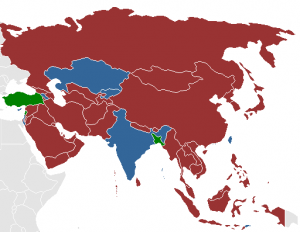Philippines women’s group, Gabriela comes out against UN recommendation to legalize prostitution in Asia
A newly published report by the United Nations Development Programme (UNDP) calls for the decriminalization of prostitution in Asia and the South Pacific as a way to prevent the spread of sexually transmitted infections like HIV and to ensure prevention and treatment are used by sex workers and their clientele.

Legal status of prostitution across Asia.
Green- Prostitution legal and regulated
Blue- Prostitution (the exchange of sex for money) legal, but organized activities such as brothels and pimping are illegal; prostitution is not regulated
Red- Prostitution illegal
Gray-No data
Public domain image/Sympatycznyfacet
In the report, “Sex Work and the Law in Asia and the Pacific“, the UNDP looked at 48 countries in Asia and the Pacific to assess laws, legal policies and law enforcement practices that affect the human rights of sex workers and impact on the effectiveness of HIV responses.
They claim that in countries where sex work has been decriminalized, there is a greater chance for safer sex practices through occupational health and safety standards across the industry. Furthermore, there is no evidence that decriminalization has increased sex work.
The report describes countries that use punitive law enforcement practices, confiscate condoms as evidence of illegal conduct, require compulsory or coerced HIV testing, deny government services and certain rights to sex workers, and have compulsory detention centres. The report notes:
- Eleven countries where sex workers report condom confiscation or police harassment for possessing condoms (China, Fiji, India, Indonesia, Malaysia, Myanmar, Nepal, Papua New Guinea, the Philippines, Sri Lanka and Vietnam).
- Six countries that require mandatory testing of sex workers for HIV or sexually transmitted infections (STIs) as a condition of employment (Guam (unincorporated territory of the United States), Indonesia, Philippines, Singapore, Thailand, and several states of Australia); and three countries where compulsory or coerced HIV testing for sex workers has been reported (China, India and Vietnam).
- At least four countries in which compulsory detention of sex workers for rehabilitation or re-education is reported (China, India, Myanmar, Sri Lanka).
“There is no evidence from countries of Asia and the Pacific that criminalization of sex work has prevented HIV epidemics among sex workers and their clients,” In fact, the report states that “evidence from the jurisdictions in the region that have decriminalized sex work – New Zealand and New South Wales (Australia) – indicates that the approach of defining sex work as legitimate labour empowers sex workers, increases their access to HIV and sexual health services and is associated with very high condom use rates.”
However, in the Philippines, the human rights group, Gabriela, the National Alliance of Women in the Philippines will have none of it.
On their website Monday, they say that legalizing prostitution will merely increase the profits of those living on the earnings of selling women’s bodies. No amount of legalization will erase the truth that this is the worse exploitation that can be done to women.
“It is naïve thinking that making prostitution legal, and hence label prostituted women as “sex workers”, will guarantee access of those in prostitution to their basic rights when even factory workers in the Philippines are deprived of their rights under the Labor code.”
Gert Ranjo-Libang, Deputy Secretary General of Gabriela said,“Prostitution is violence against women. Once their services are paid for, their “client” can do anything to them and no amount of legislation can guarantee them protection.”
She goes on to say, “The UN which is supposed to be working for the protection of women’s rights should know better than to recommend the legalization of prostitution in Asia where high joblessness is found. What will they recommend to legalize next, sex trafficking, which is the main way by which entertainment establishments can procure fresh bodies for their business.Profits from human trafficking is estimated to be at $30 billion per year. ”














